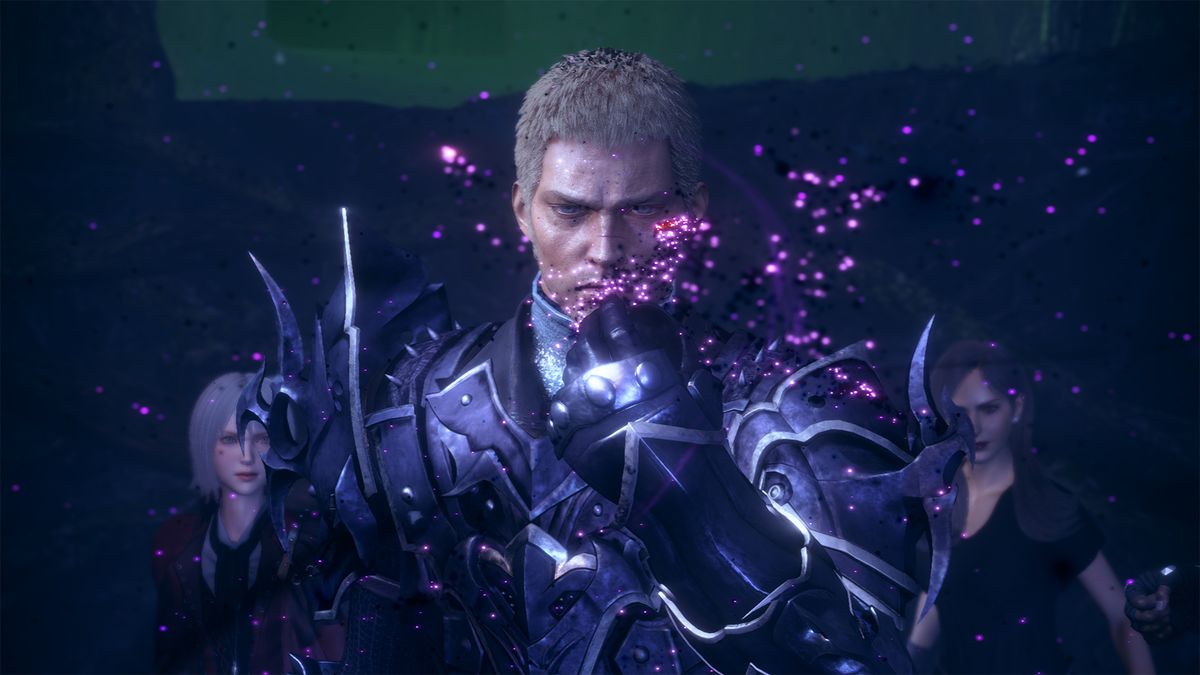12DOVE Verdict
There's a half-decent time to be had bashing your way around Stranger of Paradise's dungeons, but routine level design, rough edges and messy narrative delivery stop the experience evolving into a compelling adventure. Despite its efforts to create ordered systems, chaos has the final word.
Pros
- +
Some satisfying combat mechanics to play around with
- +
The job system adds variety
Cons
- -
Low quality script and a poorly told story
- -
Level design and loot mechanics are uninspired
- -
Combat can feel messy and random
Why you can trust 12DOVE
If you've been following Stranger of Paradise: Final Fantasy Origin, you'll surely be familiar with its ridiculous announcement trailer. It's the one where protagonist Jack, a sort of walking advert for toxic masculinity, makes it very clear that he's not a fan of Chaos. "I'm here to kill Chaos," he clarifies, repeatedly, at either end of a montage showing him tearing apart a load of monsters in a red rage that would have God of War's Kratos asking, "U OK, hun?"
Like most people, I reasonably assumed when I saw this trailer that Stranger of Paradise, an action-focused alternate universe retelling of the original Final Fantasy, was going to be very bad indeed. But after a demo offered hope that the combat might actually be quite inventive, and subsequent reveals implied some knowing irony in the overbearing script, I'd begun to believe it might be fairly good. The reality is somewhere in between. Stranger of Paradise is not entirely awful but, like Jack, it's alarmingly rough and unrefined.
Losing the plot
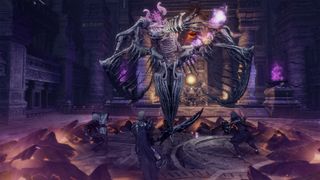
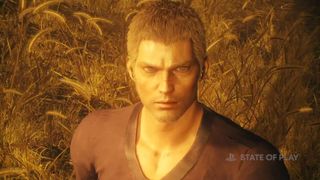
Release date: March 15, 2022
Platforms: PC, PS4, PS5, Xbox One, Xbox Series X
Developer: Team Ninja
Publisher: Square Enix
To be clear, though, the story and script really are awful, sometimes hilariously so, but awful nonetheless. We do at least get an explanation as to why the core team of characters, Jack, Ash, and Jed, who look like the results of an exchange programme between '90s boy bands, are so determined to kill Chaos. Yet Jack has all the personality and depth of an Action Man doll, which still somehow makes him more charismatic than his mates or the other characters you meet along the way.
As for the irony, there's a mildly interesting attempt to flesh out some JRPG cliches, like why a world might exist where magic crystals determine the balance of light and dark, and prophecies about planet-saving heroes emerge. And in the same way that GTA 5's Trevor is the human embodiment of the way we play GTA games – like psychopaths, basically – Jack is the embodiment of a classic JRPG hero, utterly single-minded in his quest to kill a big evil entity, even if he's not quite sure why.
But the plot is poorly paced and devoid of drama, with major revelations scattered carelessly in collectible orbs and casual conversations. It's only made worse by risible dialogue, wooden NPCs, and abrupt editing (a scene overlaid with Frank Sinatra's 'My Way' cuts out right before the climactic line, for example). The opening sections especially feel like they've been assembled from leftovers of voice recording and CGI, some of it of oddly low quality. It stumbles tipsily, serving up three different tutorial sequences outlining the basics of combat, with awkward cut scenes and flashbacks between.
Nioh your limits
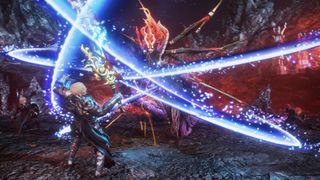
It was a relief then when I reached the last of those tutorials and the first proper dungeon, where I could get stuck into Stranger of Paradise's combat. As a collaboration between Team Ninja and Square Enix, it's no surprise that it takes inspiration from Nioh, which brings a visceral brutality to each encounter, and Final Fantasy 7 Remake, which means you're flanked by two wisecracking partners and enemies announce their attacks in writing right before unleashing them.
The job system from the original Final Fantasy is smartly implemented and refurbished. There are over 20 jobs (or classes) you can assign to Jack, with more advanced ones unlocking as you fill out skill trees on the initial selection. Each job has weapon specific regular and special attacks, plus a unique signature move. Deploying the latter at the right time is essential – whether it's hurling your lance, letting out a staggering war cry, or casting elemental spells – but requires magic points you top up by landing ordinary attacks.
Defence is equally important, of course, and I particularly appreciate Stranger of Paradise's approach to parrying, which I often find frustrating in other games. Holding down the parry button drains your 'break gauge', and as long as you have some left when an enemy's strike connects you repel it, increasing your maximum MP in the process. You don't have to worry about perfect timing, then, as long as you keep an eye on that gauge and retreat to recharge it when it gets low. Also, if you parry attacks marked with purple text, such as spells, you can absorb them and throw them right back where they came from.
As satisfying as battles are when you're chewing through monsters and delivering barbaric finishing moves, however, these systems are convoluted and brittle. Avoiding damage can be particularly tricky – with parry, block, dodge, and run all assigned to different buttons, it's easy to get mixed up when you're trying to react to rapid enemy assaults. Some attacks are heralded by a red aura and cannot be blocked, but good luck exiting their range in time if you're in mid-combo when they trigger.
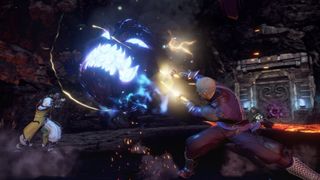
Simply keeping your foes in view can also be a nightmare. Unlike Nioh or Dark Souls, you can't often draw enemies out one at a time, so you're often in the thick of a group, facing one foe and hoping your teammates occupy the rest so they don't smack you from offscreen. Against larger bosses, meanwhile, camera and lock-on systems sometimes get involved in a titanic struggle of their own. Fighting the dragon zombie, for instance, I was advised specifically to attack the head, but locking on to its noggin made the camera swing wildly when close in, so I couldn't see what attacks were coming.
When you take into account that a couple of good hits can kill you if you don't keep gulping down potions (at least in the default 'Action' setting), it's thus often smart to hang back and let your pals do the work, not least because they can be very capable. As a test, I spent the second half of that dragon zombie fight simply staying out of the way, and eventually they whittled it down and beat it without me.
It's a shame that the difficulty can be so variable, sometimes even in the same fight, because the bosses are otherwise nicely designed, forcing you to work for openings between their assaults while keeping your guard up. But I always felt as though I had to wait for a bit of luck to see my plans come to fruition, and while Stranger of Paradise's combat is a kind of hybrid of Nioh and Final Fantasy 7 Remake, it lacks the clarity, coherence, or depth of either. The party dynamic is nowhere near as rich as that of Remake, as it makes little difference which friends you choose or what jobs you give them, while the rhythm of exchanges is never as tight as that of Nioh.
Treasure to trash
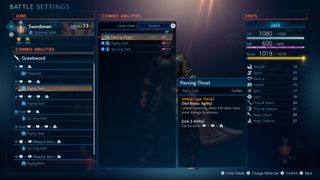
Indeed, Stranger of Paradise gets closer to Nioh when echoing the latter's weaker elements, in some pedestrian level design and loot mechanics. The missions are a familiar string of dungeons, each with one or two environmental tricks, like pools of explosive gas in a swamp, or a ballista that chucks missiles down on you as you work across a castle's battlements. Their layouts are a predictable series of loops, side passages, and locked doors, spooning you into roomfuls of enemies with the odd treasure chest to root out along the way.
Don't get too excited about the treasure, either, since it's little more than an endless spew of weapons and armour, which instantly evaporate into your inventory. I've collected thousands of bits of gear in Stranger of Paradise: Final Fantasy Origin and barely glanced at any of it. I use the auto-equip function to don the strongest stuff, then between levels dismantle the surplus into upgrade resources – tedious menu busywork. I never even use the materials either, since I'll only find better stuff in the next mission.
Quite late in the game I also realised there were side quests to dip into, again, similar to those in Nioh, but more discreetly tucked away on the world map, as if they're intentionally hiding behind the main missions. These take you back into locations you've already visited, with a new objective like hunting down a particular type of monster, but they really aren't much more than optional padding, with more recyclable junk as a reward.
Still, chasing around dungeons knocking the stuffing out of cheeky cactuars and the rest of the Final Fantasy bestiary remains reasonably absorbing, especially in co-op mode. There's no doubt that one of the draws here is that Final Fantasy setting, and it does bring something to the party, as you see how characters and locations from the original game have been reimagined and reworked. But even then, it's hardly as exciting as seeing Midgar rebuilt – how many people really care about seeing Astos the dark elf in all his 3D glory?
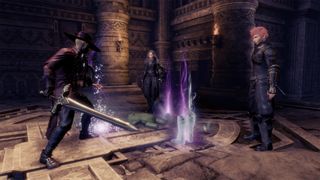
And even if they do, the low quality production robs these reveals of their impact. Whereas Final Fantasy 7 Remake expands and develops the lore of its source material, Stranger of Paradise truncates it. Yes, the dungeoneering is fleshed out and modernised, but there are no towns or overworld to explore between missions, no shops to peruse, no magical kingdoms to discover, and nothing to add intrigue to your efforts.
One of the only additional features that harks back to the wider JRPG experience is a selection of stilted conversations with NPCs that you can view between chapters. Bizarrely, these are always the same NPCs, no matter where you are, as if you teleport back to the capital after every mission purely to hear what a bunch of random city folk have to say about the state of the world. Stripped of the context of touring the world and encountering new cultures, these chats add nothing.
But that's Stranger of Paradise: Final Fantasy Origin all over. I'm left with the sense that it still doesn't quite know what it is, doesn't know how its ideas (including some fairly good ones) should fit together, and doesn't know how best to tell its story. At least by the end I could empathise with Jack's desperation to kill chaos – it runs amok over every part of the game.

Stranger of Paradise: Final Fantasy Origin was reviewed on PS5 with code provided by the publisher
Jon Bailes is a freelance games critic, author and social theorist. After completing a PhD in European Studies, he first wrote about games in his book Ideology and the Virtual City, and has since gone on to write features, reviews, and analysis for Edge, Washington Post, Wired, The Guardian, and many other publications. His gaming tastes were forged by old arcade games such as R-Type and classic JRPGs like Phantasy Star. These days he’s especially interested in games that tell stories in interesting ways, from Dark Souls to Celeste, or anything that offers something a little different.
